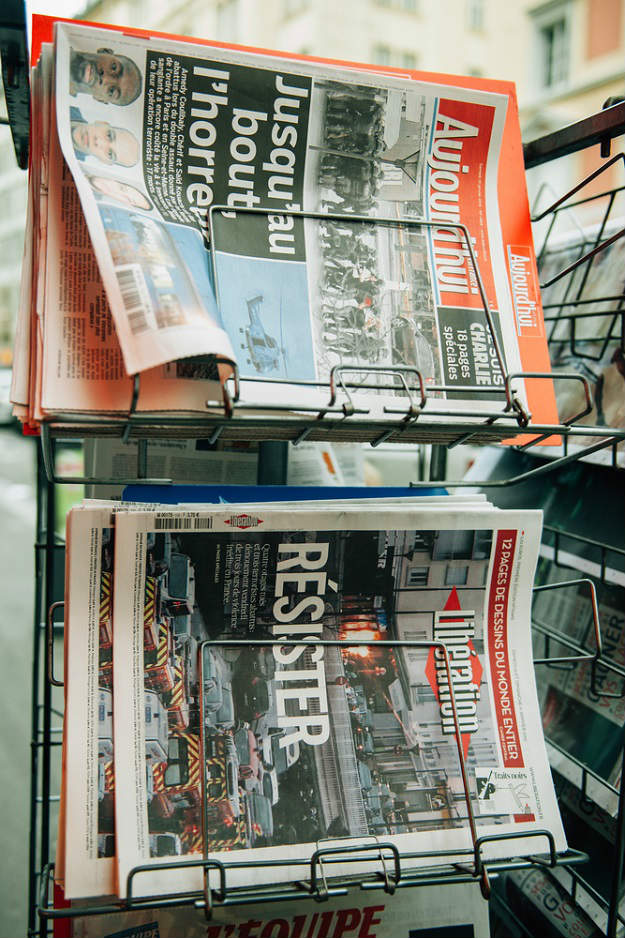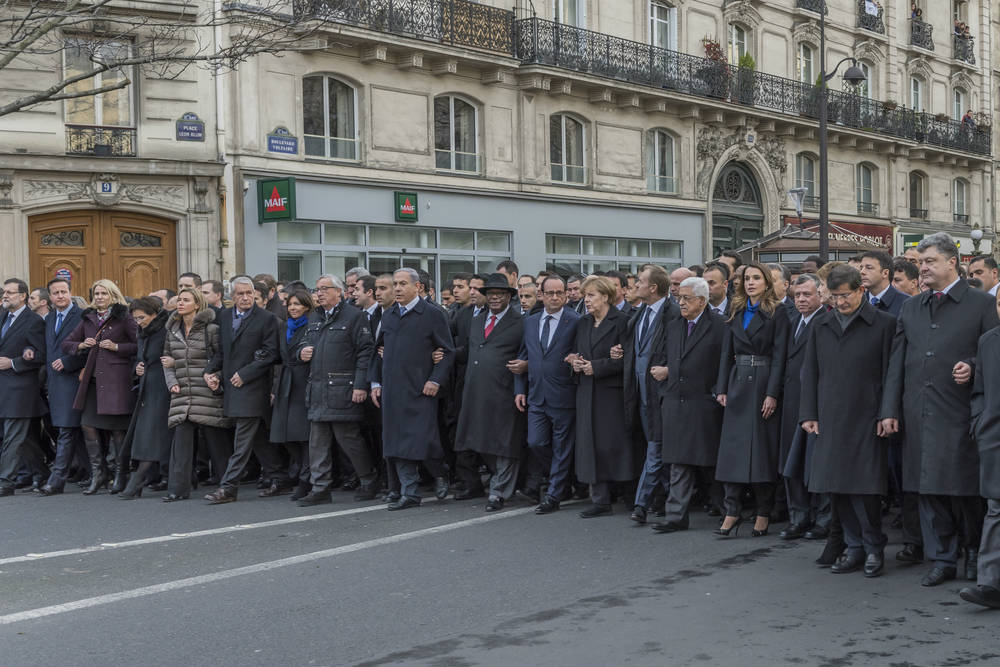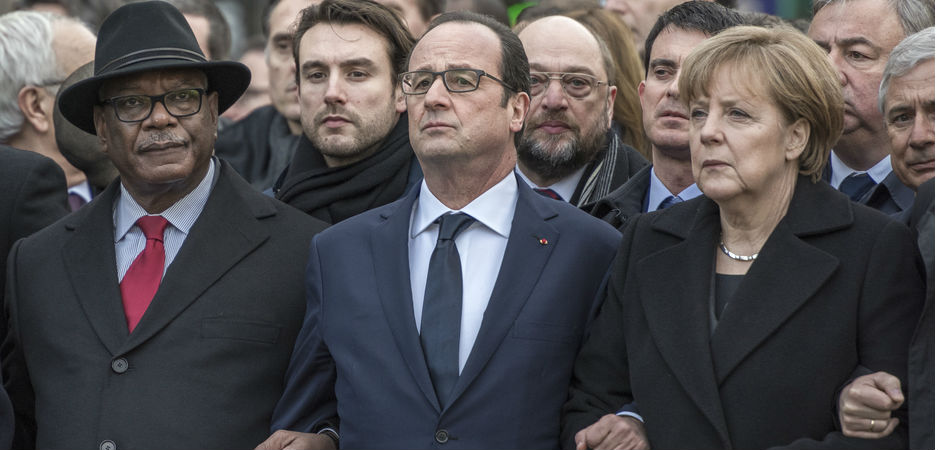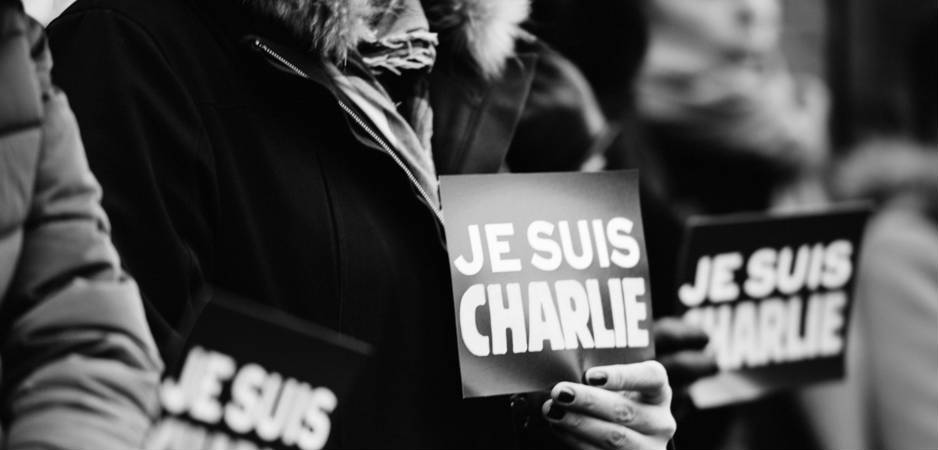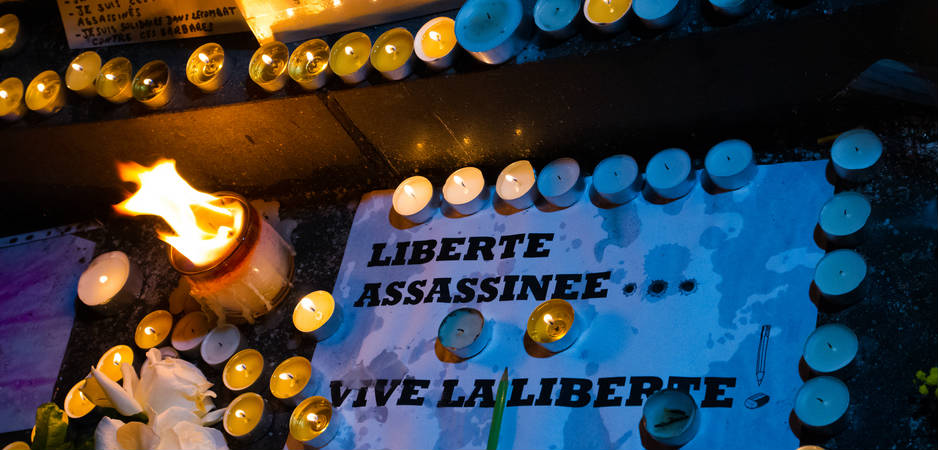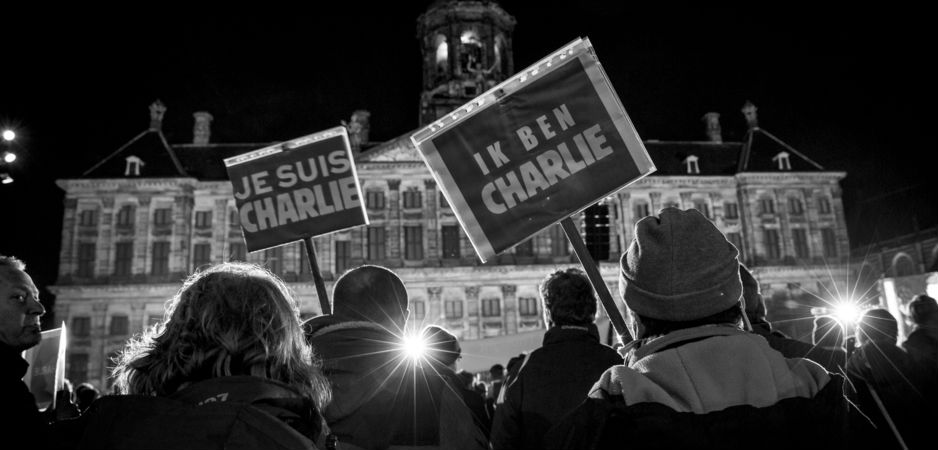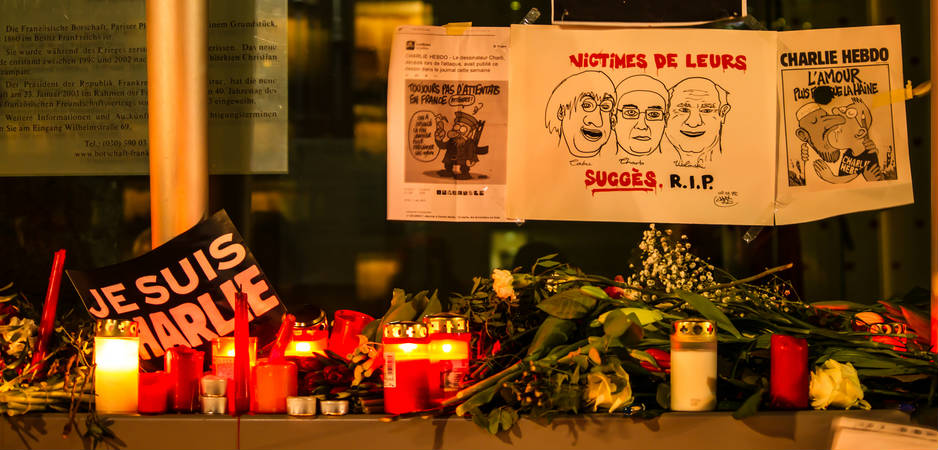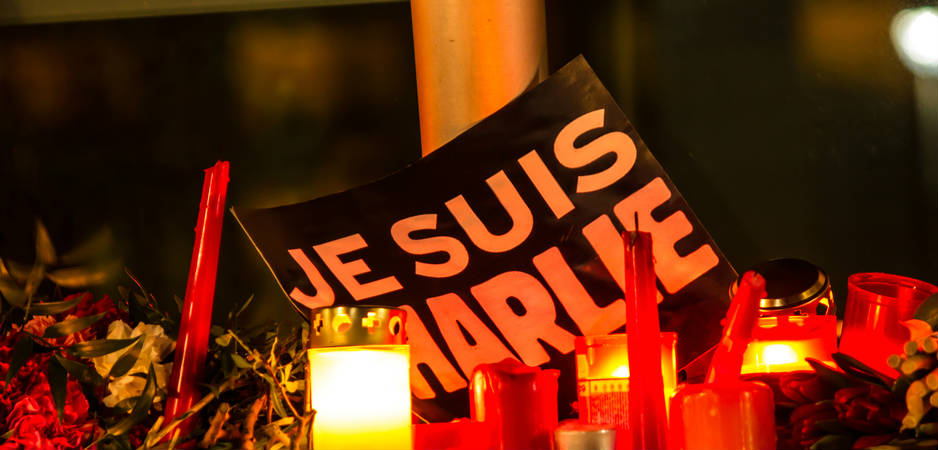In this edition of the Interview, Fair Observer talks to Ambassador Akbar Ahmed.
The terrorist attacks in France earlier this month, which resulted in the death of 17 people, has prompted a heated debate over free speech and religious intolerance.
Charlie Hebdo, a French satirical magazine that was targeted in Paris on January 7, has a long history of publishing controversial cartoons, especially those of Prophet Muhammad. The attack on the magazine’s office attracted global sympathy. World leaders from over 40 countries gathered in Paris and marched to show solidarity and express their strong support for freedom of speech. Leaders of Muslim-majority countries condemned the terrorist attacks and made it clear that such acts have no place in Islam.
However, the circumstances surrounding the attacks, and the ensuing publication of cartoons depicting the Prophet Muhammad in Charlie Hebdo’s first issue following the events as well as increased Islamophobic incidents in Europe, have brought to light the issue of freedom, blasphemy and racial tension.
In this interview, Kourosh Ziabari talks to Pakistani scholar and diplomat Ambassador Akbar Ahmed. Ahmed is the Ibn Khaldun chair of Islamic Studies at the American University in Washington DC, and he was the first distinguished chair of Middle East and Islamic Studies at the US Naval Academy. A leading proponent of interfaith dialog, Ahmed has served as the Pakistani High Commissioner to the United Kingdom. He has also taught at Princeton, Harvard and Cambridge Universities.
Kourosh Ziabari: The recent terrorist attacks in France were despicable; they should be condemned. However, there are politicians and media organizations in the West who automatically directed the finger of accusation against Muslims shortly after the attack. The accusation of Muslims being responsible for every terrorist attack that takes place is a dangerous trend emerging in the West. What’s your take on that?
Akbar Ahmed: The trend of Islamophobia is a very real concern in the West, something which was exacerbated but not created by the tragic events on 9/11. Too often, the violent acts of only a few Muslims cast a shadow over the entire community and their faith. We need to combat this kind of knee-jerk reaction with in-depth understanding of the Muslim community and the religion of Islam. It was to provide this kind of understanding that I embarked on a quartet of studies published by Brookings Institution Press examining relations between the West and the Muslim world after 9/11.
Ziabari: Muslims in the West have often contributed to the progress and growth of the societies they live in. Many of the prominent physicians, entrepreneurs, scientists, university professors, artists and authors in the United States and Europe come from different Muslim countries. So, why is it still on the agenda of some Western leaders to promote the idea that Muslims are dangerous, harmful people who cannot live with other members of society peacefully?
Ahmed: This is, unfortunately, a product of the misunderstanding of the Islamic faith and the fear of “the other,” which is too often perpetuated through mass media today in their attempts to gain a wider readership. The many, many millions of Muslims living peacefully and positively contributing to society is not news. People need to have a better understanding of the many positive contributions Muslims make in Western societies.
Ziabari: The Charlie Hebdo shooting was attributed to al-Qaeda in the Arabian Peninsula. It’s quite clear that al-Qaeda doesn’t represent Islam, since it’s oriented on a rigid, illogical and extremist reading of the religion; there’s no Muslim leader in the world, either Sunni or Shiite, who endorses al-Qaeda and its atrocities. So, why do the mainstream media, intellectuals and politicians in the West still insist on attributing the mass killing to Muslims?
Ahmed: This again goes back to the ignorance of many concerning the teachings of Islam, which strongly forbids the killing of innocent people and promotes, above all else, mercy and compassion. Rather than coming from Islam, al-Qaeda in the Arabian Peninsula, and other similar groups like Boko Haram, the Taliban and al-Shabab, emerge from tribal societies locked in conflict with their central governments. The motivations for many of their actions, though justified with Islamic rhetoric, come from this broken relationship between center and periphery — a relationship I studied in my previous book, The Thistle and the Drone: How America’s War on Terror Became a Global War on Tribal Islam.
When one looks at the actions of the Taliban in Pakistan, for instance, they often talk of “revenge” against the central government for actions taken in tribal areas. These acts of revenge have nothing to do with Islam, which expressly forbids the taking of revenge. Many commentators in the West [do] not understand the underlying causes of such violence and, instead, see it as evidence of a clash of civilizations in which Islam [is] locked in conflict with the West, despite the fact that much of the violence in the Muslim world is directed toward other Muslims. There needs to be a greater effort, in both the Muslim and non-Muslim world, to better understand these conflicts in order to find effective solutions to ending them.
Ziabari: You surely remember the killing of Marwa el-Sherbini, an Egyptian-German woman who was stabbed to death by an ethnic German immigrant from Russia in a courtroom in Dresden on July 1, 2009. That incident never got the attention and coverage that the Charlie Hebdo shootings received, even though it was completely evident that it was driven by religious and racial hatred. Why do you think there is a disparity and unevenness here?
Ahmed: While any such act — however large or small and whomever the victim or victims may be — must be equally and strongly condemned, I believe the Charlie Hebdo attack garnered such strong media attention [due to the] the scale and barbarity of the attack, and the fact that it feeds into this broad and growing Islamophobia in the West today. To many in the West, the attack represented something larger than simply a brutal act of murder. Many saw it as an attack on the values of free speech and freedom of the press, a cornerstone of Western democratic societies.
This only fed into what many [saw] as a clash of civilizations. Few understood the background of the community from which the attackers came from. Many Muslims in France come from former French colonies. They have interacted with France and French culture for centuries throughout the period of colonization and yet, when arriving on French shores, they are not received with a warm welcome and have struggled to integrate into broader French society. The issues, both contemporary and historical, surrounding Muslims of France and Europe as a whole are the subject of my latest study, Journey into Europe: Islam, Immigration, and Empire.
Ziabari: On January 11, 40 world leaders attended a solidarity march in Paris to express their support for freedom of speech and to sympathize with the families of the shooting victims. However, it is widely argued that some of these leaders are themselves responsible for suppressing freedom of speech in their countries, including Israeli Prime Minister Binyamin Netanyahu. Do you agree with those commentators who described the march as a show of hypocrisy?
Ahmed: I am saddened to see that there is so much political and social turmoil in the Middle East, in Iran, Afghanistan and Pakistan. I have been involved with promoting interfaith dialog for the past few decades, and anyone who has the best interests of the umma [global Muslim community] at heart should work to promote peace, because Muslims in the umma are suffering the most.
I believe that nations such as Iran and Israel, who see themselves in opposition to each other, need to emphasize what is common in the faiths that dominate their lands. I am constantly surprised at how close the bonds are between Abrahamic faiths and how these can help to build more peace and harmony in our troubled world.
Ziabari: There’s a verse in the Quran that says: “Whosoever kills a human being for other than manslaughter or corruption, it shall be as if he had killed all mankind.” This can be a theoretical and intellectual foundation for making arguments about the nature of Islam, and that it condemns violence, terrorism and the killing of innocent people. Why do opponents of Islam fail to comprehend the importance of this divine verdict?
Ahmed: Unfortunately, many people in the West do not understand the true teachings of Islam. It is a failure of both the media — to fairly and accurately report on these incidents — and the Muslim community itself to effectively teach non-Muslims in the West about their faith. Muslims need to work harder to educate others about Islam, especially when there are voices from far-right groups that promote mistrust and misunderstanding of Islam. Only through better understanding and dialogue can we build a peaceful and secure society, with people of all different faiths and cultures living together.
Ziabari: One argument being made regarding the Charlie Hebdo shooting spree is that it was a result of the West’s “sponsorship of the Islamic State,” which is claimed to have been propped up to bring down the Iraqi and Syrian governments but is now backfiring. Do you agree?
Ahmed: The origins of so many of these new groups — such as ISIS [Islamic State] — remain obscure. We are, therefore, faced with groups that commit violence and atrocities in the name of Islam. Pointing fingers does not solve the problem, nor does it alleviate the suffering of millions of Muslims across the world. Leaders in the region, both Muslim and non-Muslim, have to show more compassion and reason to guide us through this dark period of history.
I was privileged to have a meeting with President Hassan Rouhani during his recent trip to New York City. He struck me as a scholarly leader committed to building peace and harmony. I was privileged to present him with my book, Living Islam. Some years ago, I also had the pleasure of having a similar dinner with President Mohammad Khatami. He was kind enough to send me an article that was published in a book I co-edited with my colleague, Brian Forst, called After Terror: Promoting Dialogue Among Civilizations. I appreciated his call for the dialogue of civilizations. The world needs to hear more of this dialogue of civilizations rather than talk of the clash of civilizations.
Ziabari: Freedom of speech is a universal value. But even the proponents of free speech and plurality, including Pope Francis, have made it clear that with every kind of freedom comes responsibilities, and there’s no boundless freedom to insult other religions and what millions of people hold to be sacred and holy. In this light, what’s your assessment of the frequent publication of sacrilegious cartoons in Western media that ridicule Prophet Muhammad and Islamic beliefs? Are they justifiable?
Ahmed: I, of course, denounce any attempts at maligning or attacking Islam and, at the same time, I denounce those that would use these attacks, or the cartoons of the Holy Prophet, as a [pretext] for violence. While many in Western media push the boundaries of free speech, arguing that this is a part of living in a democratic society, they need to understand that they are living in a globalized world where their actions have an impact beyond their country, as we see in the case of these cartoons. They need to be more sensitive to issues surrounding religion, especially for a minority community that already feels vulnerable. While free speech and freedom of the press should be part of every society, it should not be abused to put minority communities under further pressure.
Fair Observer is a nonprofit organization dedicated to informing and educating global citizens about the critical issues of our time. Please donate to keep us going.
The views expressed in this article are the author’s own and do not necessarily reflect Fair Observer’s editorial policy.
Photo Credit: Ventdusud / Hadrian / Frederic Legrand – COMEO / Shutterstock.com
For more than 10 years, Fair Observer has been free, fair and independent. No billionaire owns us, no advertisers control us. We are a reader-supported nonprofit. Unlike many other publications, we keep our content free for readers regardless of where they live or whether they can afford to pay. We have no paywalls and no ads.
In the post-truth era of fake news, echo chambers and filter bubbles, we publish a plurality of perspectives from around the world. Anyone can publish with us, but everyone goes through a rigorous editorial process. So, you get fact-checked, well-reasoned content instead of noise.
We publish 2,500+ voices from 90+ countries. We also conduct education and training programs
on subjects ranging from digital media and journalism to writing and critical thinking. This
doesn’t come cheap. Servers, editors, trainers and web developers cost
money.
Please consider supporting us on a regular basis as a recurring donor or a
sustaining member.
Support Fair Observer
We rely on your support for our independence, diversity and quality.
Will you support FO’s journalism?
We rely on your support for our independence, diversity and quality.



